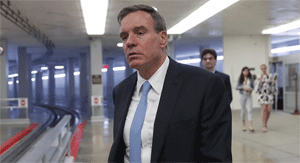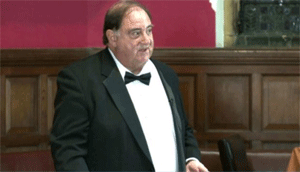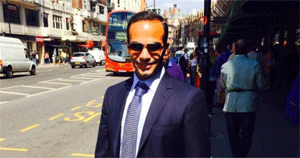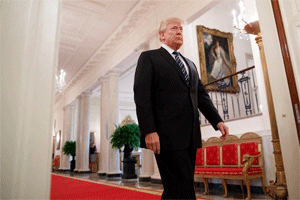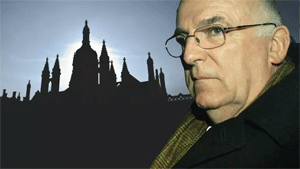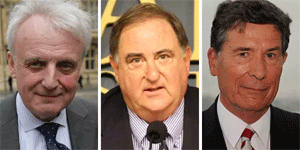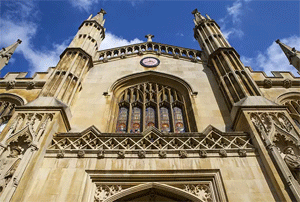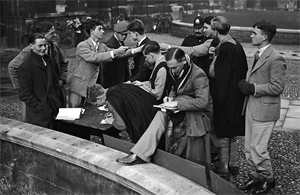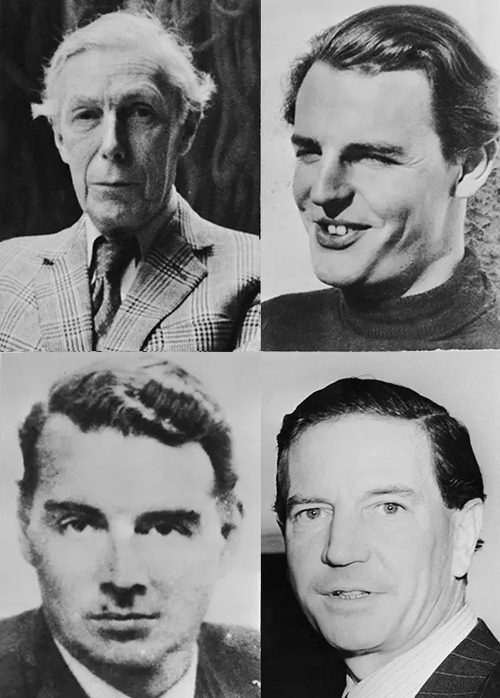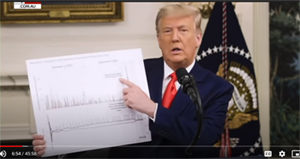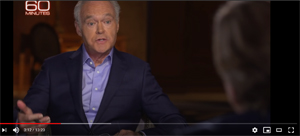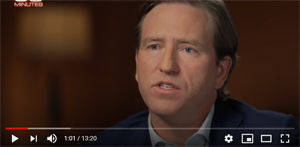by Glenn Greenwald
May 19 2018, 7:27 a.m.
NOTICE: THIS WORK MAY BE PROTECTED BY COPYRIGHT
YOU ARE REQUIRED TO READ THE COPYRIGHT NOTICE AT THIS LINK BEFORE YOU READ THE FOLLOWING WORK, THAT IS AVAILABLE SOLELY FOR PRIVATE STUDY, SCHOLARSHIP OR RESEARCH PURSUANT TO 17 U.S.C. SECTION 107 AND 108. IN THE EVENT THAT THE LIBRARY DETERMINES THAT UNLAWFUL COPYING OF THIS WORK HAS OCCURRED, THE LIBRARY HAS THE RIGHT TO BLOCK THE I.P. ADDRESS AT WHICH THE UNLAWFUL COPYING APPEARED TO HAVE OCCURRED. THANK YOU FOR RESPECTING THE RIGHTS OF COPYRIGHT OWNERS.
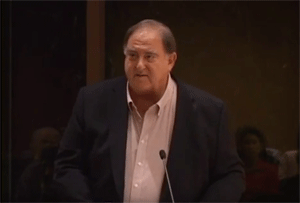
AN EXTREMELY STRANGE EPISODE that has engulfed official Washington over the last two weeks came to a truly bizarre conclusion on Friday night. And it revolves around a long-time, highly sketchy CIA operative, Stefan Halper.
Four decades ago, Halper was responsible for a long-forgotten spying scandal involving the 1980 election, in which the Reagan campaign – using CIA officials managed by Halper, reportedly under the direction of former CIA Director and then-Vice-Presidential candidate George H.W. Bush – got caught running a spying operation from inside the Carter administration. The plot involved CIA operatives passing classified information about Carter’s foreign policy to Reagan campaign officials in order to ensure the Reagan campaign knew of any foreign policy decisions that Carter was considering.
Over the past several weeks, House Republicans have been claiming that the FBI during the 2016 election used an operative to spy on the Trump campaign, and they triggered outrage within the FBI by trying to learn his identity. The controversy escalated when President Trump joined the fray on Friday morning. “Reports are there was indeed at least one FBI representative implanted, for political purposes, into my campaign for president,” Trump tweeted, adding: “It took place very early on, and long before the phony Russia Hoax became a “hot” Fake News story. If true – all time biggest political scandal!”
In response, the DOJ and the FBI’s various media spokespeople did not deny the core accusation, but quibbled with the language (the FBI used an “informant,” not a “spy”), and then began using increasingly strident language to warn that exposing his name would jeopardize his life and those of others, and also put American national security at grave risk. On May 8, the Washington Post described the informant as “a top-secret intelligence source” and cited DOJ officials as arguing that disclosure of his name “could risk lives by potentially exposing the source, a U.S. citizen who has provided intelligence to the CIA and FBI.”
The top Democrat on the Senate Intelligence Committee, Mark Warner, who spent much of last week working to ensure confirmation of Trump’s choice to lead the CIA, Gina Haspel, actually threatened his own colleagues in Congress with criminal prosecution if they tried to obtain the identity of the informant. “Anyone who is entrusted with our nation’s highest secrets should act with the gravity and seriousness of purpose that knowledge deserves,” Warner said.
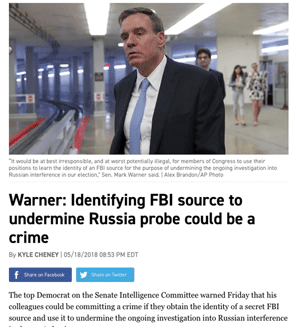
But now, as a result of some very odd choices by the nation’s largest media outlets, everyone knows the name of the FBI’s informant: Stefan Halper. And Halper’s history is quite troubling, particularly his central role in the scandal in the 1980 election. Equally troubling are the DOJ and FBI’s highly inflammatory and, at best, misleading claims that they made to try to prevent Halper’s identity from being reported.
To begin with, it’s obviously notable that the person the FBI used to monitor the Trump campaign is the same person who worked as a CIA operative running that 1980 Presidential election spying campaign.
It was not until several years after Reagan’s victory over Carter did this scandal emerge. It was leaked by right-wing officials inside the Reagan administration who wanted to undermine officials they regarded as too moderate, including then White House Chief of Staff James Baker, who was a Bush loyalist.
The NYT in 1983 said the Reagan campaign spying operation “involved a number of retired Central Intelligence Agency officials and was highly secretive.” The article, by then-NYT reporter Leslie Gelb, added that its “sources identified Stefan A. Halper, a campaign aide involved in providing 24-hour news updates and policy ideas to the traveling Reagan party, as the person in charge.” Halper, now 73, had also worked with Donald Rumsfeld, Dick Cheney, and Alexander Haig as part of the Nixon administration.
When the scandal first broke in 1983, the UPI suggested that Halper’s handler for this operation was Reagan’s Vice Presidential candidate, George H.W. Bush, who had been the CIA Director and worked there with Halper’s father-in-law, former CIA Deputy Director Ray Cline, who worked on Bush’s 1980 presidential campaign before Bush ultimately became Reagan’s Vice President. It quoted a former Reagan campaign official as blaming the leak on “conservatives [who] are trying to manipulate the Jimmy Carter papers controversy to force the ouster of White House Chief of Staff James Baker.”
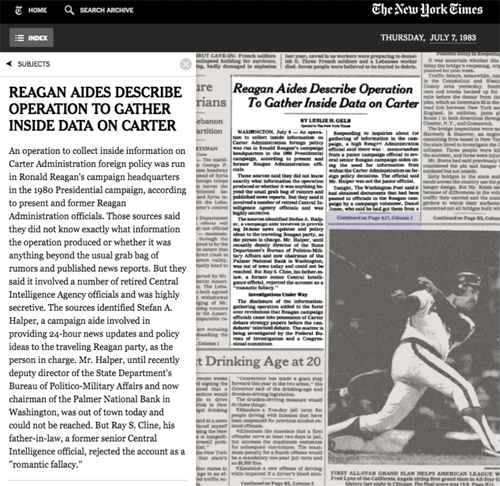
Halper, through his CIA work, has extensive ties to the Bush family. Few remember that the CIA’s perceived meddling in the 1980 election – its open support for its former Director, George H.W. Bush to become President – was a somewhat serious political controversy. And Halper was in that middle of that, too.
In 1980, the Washington Post published an article reporting on the extremely unusual and quite aggressive involvement of the CIA in the 1980 presidential campaign. “Simply put, no presidential campaign in recent memory — perhaps ever — has attracted as much support from the intelligence community as the campaign of former CIA director Bush,” the article said.
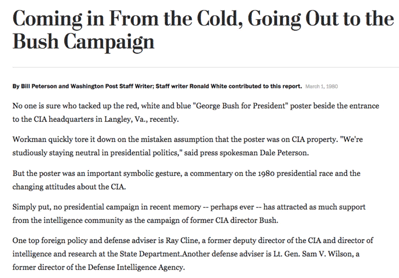
Though there was nothing illegal about ex-CIA officials uniting to put a former CIA Director in the Oval Office, the paper said “there are some rumblings of uneasiness in the intelligence network.” It specifically identified Cline as one of the most prominent CIA official working openly for Bush, noting that he “recommended his son-in-law, Stefan A. Halper, a former Nixon White House aide, be hired as Bush’s director of policy development and research.”
In 2016, top officials from the intelligence community similarly rallied around Hillary Clinton. As The Intercept has previously documented:
Former acting CIA Director Michael Morell not only endorsed Clinton in the New York Times but claimed that “Mr. Putin had recruited Mr. Trump as an unwitting agent of the Russian Federation.” George W. Bush’s CIA and NSA director, Gen. Michael Hayden, pronounced Trump a “clear and present danger” to U.S. national security and then, less than a week before the election, went to the Washington Post to warn that “Donald Trump really does sound a lot like Vladimir Putin” and said Trump is “the useful fool, some naif, manipulated by Moscow, secretly held in contempt, but whose blind support is happily accepted and exploited.”
So as it turns out, the informant used by the FBI in 2016 to gather information on the Trump campaign was not some previously unknown, top-secret asset whose exposure as an operative could jeopardize lives. Quite the contrary: his decades of work for the CIA – including his role in an obviously unethical if not criminal spying operation during the 1980 presidential campaign – is quite publicly known.
AND NOW, as a result of some baffling choices by the nation’s largest news organizations as well as their anonymous sources inside the U.S. Government, Stefan Halper’s work for the FBI during the 2016 is also publicly known
Last night, both the Washington Post and New York Times – whose reporters, like pretty much everyone in Washington, knew exactly who the FBI informant is – published articles that, while deferring to the FBI’s demands by not naming him, provided so many details about him that it made it extremely easy to know exactly who it is. The NYT described the FBI informant as “an American academic who teaches in Britain” and who “made contact late that summer with” George Papadopoulos and “also met repeatedly in the ensuing months with the other aide, Carter Page.” The Post similarly called him “a retired American professor” who met with Page “at a symposium about the White House race held at a British university.”
In contrast to the picture purposely painted by the DOJ and its allies that this informant was some sort of super-secret, high-level, covert intelligence asset, the NYT described him as what he actually is: “the informant is well known in Washington circles, having served in previous Republican administrations and as a source of information for the C.I.A. in past years.”
Despite how “well known” he is in Washington, and despite publishing so many details about him that anyone with Google would be able to instantly know his name, the Post and the NYT nonetheless bizarrely refused to identity him, with the Post justifying its decision that it “is not reporting his name following warnings from U.S. intelligence officials that exposing him could endanger him or his contacts.” The NYT was less melodramatic about it, citing a general policy: the NYT “has learned the source’s identity but typically does not name informants to preserve their safety,” it said.
In other words, both the NYT and the Post chose to provide so many details about the FBI informant that everyone would know exactly who it was, while coyly pretending that they were obeying FBI demands not to name him. How does that make sense? Either these newspapers believe the FBI’s grave warnings that national security and lives would be endangered if it were known who they used as their informant (in which case those papers should not publish any details that would make his exposure likely), or they believe that the FBI (as usual) was just invoking false national security justifications to hide information it unjustly wants to keep from the public (in which case the newspapers should name him).
In any event, publication of those articles by the NYT and Post last night made it completely obvious who the FBI informant was, because the Daily Caller’s investigative reporter Chuck Ross on Thursday had published an article reporting that a long-time CIA operative who is now a professor at Cambridge repeatedly met with Papadopoulos and Page. The article, in its opening paragraph, named the professor, Stefan Halper, and described him as “a University of Cambridge professor with CIA and MI6 contacts.”
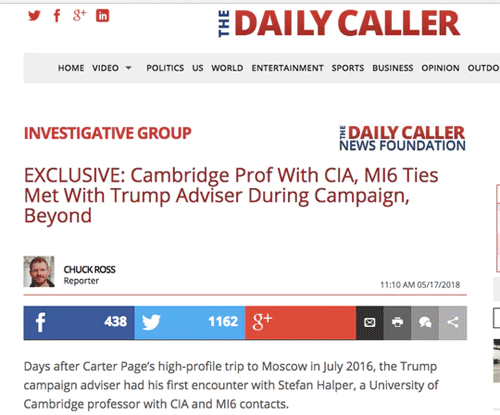
Ross’ article, using public information, recounted at length Halper’s long-standing ties to the CIA, including the fact that his father-in-law, Ray Cline, was a top CIA official during the Cold War, and that Halper himself had long worked with both the CIA and its British counterpart, the MI6. As Ross wrote: “at Cambridge, Halper has worked closely with Dearlove, the former chief of MI6. In recent years they have directed the Cambridge Security Initiative, a non-profit intelligence consulting group that lists ‘UK and US government agencies’ among its clients.”
Both the NYT and Washington Post reporters boasted, with seeming pride, about the fact that they did not name the informant even as they published all the details which made it simple to identify him. But NBC News – citing Ross’ report and other public information – decided to name him, while stressing that it has not confirmed that he actually worked as an FBI informant:
The professor who met with both Page and Papadopoulos is Stefan Halper, a former official in the Nixon, Ford and Reagan administrations who has been a paid consultant to an internal Pentagon think tank known as the Office of Net Assessment, consulting on Russia and China issues, according to public records.
Ken Dilanian
@KenDilanianNBC
“The professor who met with both Page and Papadopoulos is Stefan Halper, a former official in the Nixon, Ford and Reagan administrations who has been a paid consultant to an internal Pentagon think tank known as the Office of Net Assessment.” https://www.nbcnews.com/news/amp/ncna875516 …
7:17 PM - May 18, 2018Was there really a federal spy inside the Trump campaign?
The president's claim of a "spy" inside his campaign has been dismissed as absurd, but the FBI has been known to send informants to speak to suspects.
nbcnews.com
THERE IS NOTHING inherently untoward, or even unusual, about the FBI using informants in an investigation. One would expect them to do so. But the use of Halper in this case, and the bizarre claims made to conceal his identity, do raise some questions that merit further inquiry.
To begin with, the New York Times reported in December of last year that the FBI investigation into possible ties between the Trump campaign and Russia began when George Papadopoulos drunkenly boasted to an Australian diplomat about Russian dirt on Hillary Clinton. It was the disclosure of this episode by the Australians that “led the F.B.I. to open an investigation in July 2016 into Russia’s attempts to disrupt the election and whether any of President Trump’s associates conspired,” the NYT claimed.
But it now seems clear that Halper’s attempts to gather information for the FBI began before that. “The professor’s interactions with Trump advisers began a few weeks before the opening of the investigation, when Page met the professor at the British symposium,” the Post reported. While it’s not rare for the FBI to gather information before formally opening an investigation, Halper’s earlier snooping does call into question the accuracy of the NYT’s claim that it was the drunken Papadopoulos ramblings that first prompted the FBI’s interest in these possible connections. And it suggests that CIA operatives, apparently working with at least some factions within the FBI, were trying to gather information about the Trump campaign earlier than had been previously reported.
Then there are questions about what appear to be some fairly substantial government payments to Halper throughout 2016. Halper continues to be listed as a “vendor” by websites that track payments by the federal government to private contractors.
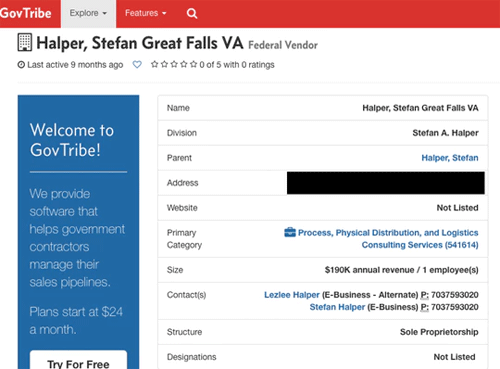
Earlier this week, records of payments were found that were made during 2016 to Halper by the Department of Defense’s Office of Net Assessment, though it [is] not possible from these records to know the exact work for which these payments were made. The Pentagon office that paid Halper in 2016, according to a 2015 Washington Post story on its new duties, “reports directly to Secretary of Defense and focuses heavily on future threats, has a $10 million budget.”

It is difficult to understand how identifying someone whose connections to the CIA is a matter of such public record, and who has a long and well-known history of working on spying programs involving presidential elections on behalf of the intelligence community, could possibly endanger lives or lead to grave national security harm. It isn’t as though Halper has been some sort of covert, stealth undercover asset for the CIA who just got exposed. Quite the contrary: that he’s a spy embedded in the U.S. intelligence community would be known to anyone with internet access.
Equally strange are the semantic games which journalists are playing in order to claim that this revelation disproves, rather than proves, Trump’s allegation that the FBI “spied” on his campaign. This bizarre exchange between CNN’s Andrew Kaczynski and the New York Times’ Trip Gabriel vividly illustrates the strange machinations used by journalists to justify how all of this is being characterized:
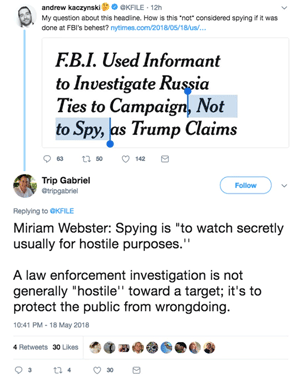
andrew kaczynski
My question about this headline. How is this "not" considered spying if it was done at FBI''s behest? nytimes.com/2018/05/18/us ...
F.B.I. Used Informant to Investigate Russia Ties to Campaign, Not to Spy, as Trump Claims
Trip Gabriel@tripgabriel
Miriam Webster: Spying is "to watch secretly usually for hostile purposes."
A law enforcement investigation is not generally "hostile" toward a target; it's to protect the public from wrongdoing.
19:41 PM - 18 May 2018
Despite what Halper actually is, the FBI and its dutiful mouthpieces have spent weeks using the most desperate language to try to hide Halper’s identity and the work he performed as part of the 2016 election. Here was the deeply emotional reaction to last night’s story from Brookings’ Benjamin Wittes, who has become a social media star by parlaying his status as Jim Comey’s best friend and long-time loyalist to security state agencies into a leading role in pushing the Trump/Russia story:
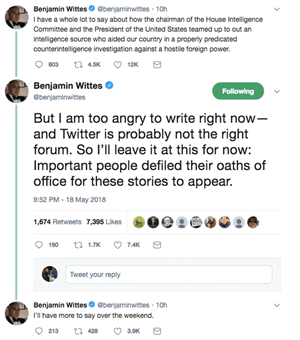
Benjamin Wittes@benjaminwittes
I have a whole lot to say about how the chairman of the House Intelligence Committee and the President of the United States teamed up to out an intelligence source who aided our country in a properly predicated counterintelligence investigation against a hostile foreign power.
Benjamin Wittes@benjaminwittes
But I am too angry to write right now -- and Twitter is probably not the right forum. So I'll leave it at this for now: Important people defiled their oaths of office for these stories to appear.
9:52 PM - 18 May 2018
Benjamin Wittes@benjaminwittes
I'll have more to say over the weekend.
Wittes’ claim that all of this resulted in the “outing” of some sort of sensitive “intelligence source” is preposterous given how publicly known Halper’s role as a CIA operative has been for decades. But this is the scam that the FBI and people like Mark Warner have been running for two weeks: deceiving people into believing that exposing Halper’s identity would create grave national security harm by revealing some previously unknown intelligence asset.
Wittes also implies that it was Trump and Devin Nunes who are responsible for Halper’s exposure but he almost certainly has no idea of who the sources are for the NYT or the Washington Post. And note that Wittes is too cowardly to blame the institutions that actually made it easy to identify Halper – the New York Times and Washington Post – preferring instead to exploit the opportunity to depict the enemies of his friend Jim Comey as traitors.
Whatever else is true, the CIA operative and FBI informant used to gather information on the Trump campaign in the 2016 campaign has, for weeks, been falsely depicted as a sensitive intelligence asset rather than what he actually is: a long-time CIA operative with extensive links to the Bush family who was responsible for a dirty and likely illegal spying operation in the 1980 presidential election. For that reason, it’s easy to understand why many people in Washington were so desperate to conceal his identity, but that desperation had nothing to do with the lofty and noble concerns for national security they claimed were motivating them.

